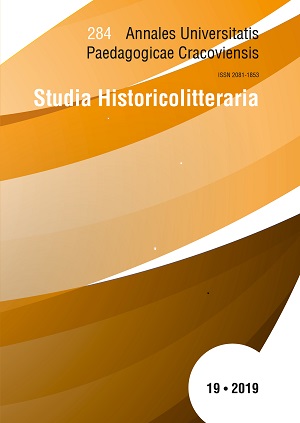'Zaczarowane koło' in the abstract by Koneczny
Main Article Content
Abstract
Feliks Koneczny regarded Lucjan Rydel as a talented and hard-working writer. After the stage success of Zaczarowane koło (1899), he was convinced that the author could rival with Stanisław Wyspiański. In his broad review, published in Przegląd Polski, while reflecting a plot scheme of the work, he was at the same time looking for structural justification of action process. He noticed dramatic, linguistic and psychological values of Rydel’s ‘dramatic fairy tale.’ He appreciated Rydel’s writing skills. However, he also expected the type of art which was uniform in terms of genre. Looking into the way in which realistic and symbolic elements were combined with folklore, he discovered the cause of compositional imperfections of Zaczarowane koło, which he analysed deeply and assessed objectively.
Downloads
Article Details

This work is licensed under a Creative Commons Attribution-NonCommercial-NoDerivatives 4.0 International License.
COPYRIGHT POLICY
The publisher of "Annales Universitatis Paedagogicae Cracoviensis.Studia Historicolitteraria" is authorised to use and distribute all the materials published in the journal on the basis of a non-exclusive licence agreement unlimited in time – previously concluded for an indefinite period of time each time with the author of a specific paper in the fields of exploitation specified in the agreement.
OPEN ACCESS POLICY
"Annales Universitatis Paedagogicae Cracoviensis.Studia Historicolitteraria” is an open access journal, and all its contents are available for free to users and/or their institutions on the basis of non-exclusive licenses under Creative Commons (CC BY CC-BY-4.0). Users can read, download, make copies, distribute, print, search, or to link to full text articles in this journal without the prior permission of the publisher or the author.This is consistent with the definition of open access BOAI (http://www.soros.org/openaccess).
References
Bartmiński J., Niebrzegowska-Bartmińska S., Tekstologia, 3 dodr. 1 wyd., Warszawa 2012.
Głowiński M., Kostkiewiczowa T., Okopień-Sławińska A., Sławiński J., Słownik terminów literackich, red. J. Sławiński, dodr. 4 wyd. bez zm., Wrocław – Warszawa – Kraków 2007.
Gołaszewska M., Filozoficzne podstawy krytyki literackiej, Warszawa 1963.
Irzykowski K., Pałuba. Sny Marii Dunin, Lwów 1903.
Irzykowski K., Walka o treść. Beniaminek, tekst oprac. i indeks sporz. A. Lam, Kraków 1976.
Kalemba-Kasprzak E., Streszczenie jako recenzja (O recenzjach teatralnych Tadeusza Boya- Żeleńskiego), [w:] Szkice o krytyce teatralnej, red. E. Udalska, Katowice 1981.
Kolberg O., Lud. Jego zwyczaje, sposób życia, mowa, podania, przysłowia, obrzędy, gusła, zabawy, pieśni, muzyka i tańce, t. [właśc. serie] 3, 7, 15, 17, Warszawa 1865 – Kraków 1890.
Koneczny F., Teatr krakowski, „Przegląd Polski” 1899, z. 396.
Linde M.S.B., Słownik języka polskiego, wyd. fotooffs., t. 4, Lwów 1858.
Michalik J., Dzieje teatru w Krakowie w latach 1893–1915, t. 5, cz. 1, vol. 2: Teatr Miejski, Kraków – Wrocław 1985.
Prokesch W., „Zaczarowane koło”. Baśń dramatyczna w pięciu aktach wierszem. Napisał Lucjan Rydel. (Odznaczone pierwszą nagrodą na konkursie Paderewskiego), „Nowa Reforma” 1899, nr 88.
Rydel L., Zaczarowane koło, [w:] tegoż, Wybór dramatów, oprac. L. Tatarowski, BN, seria I, nr 247, Wrocław – Warszawa – Kraków – Gdańsk – Łódź 1983.
Sławińska I., Odczytywanie dramatu, Warszawa 1988.
St.W. [S. Wyrzykowski], „Zaczarowane koło”, baśń dramatyczna w 5 aktach wierszem, przez Lucjana. Rydla, „Życie” 1899, nr 8.
X.M.R. [ks. M. Radziwiłł], Ostatnia wojewodzina wileńska (Helena z Przeździeckich ks. Radziwiłłowa), Lwów 1892.
